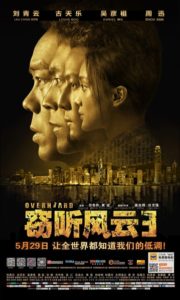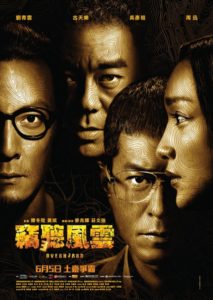Overh3ard
窃听风云3
Hong Kong/China, 2014, colour, 2.35:1, 131 mins.
Directors: Mai Zhaohui 麦兆辉 [Alan Mak], Zhuang Wenqiang 庄文强 [Felix Chong].
Rating: 7/10.
Third in the bugging series is more involving as a character drama, with a powerhouse cast.
Hong Kong, the present day. As the government plans to abolish traditional “ding rights” 丁权 – which since 1972 had legally granted one plot of land to each male descendant of “indigenous” New Territories families (i.e. resident since 1898) – the powerful Lu clan, led by onetime village head Lu Hantao (Zeng Jiang), plans to buy up all “ding rights” lots in the area and build a massive skyscraper in the countryside via his company Lu Guo Group. While wooing a potential Mainland investor, Wan Shan (Huang Lei), Lu Hantao has also arranged for one recalcitrant clan member, Lu Yongyuan (Qian Jiale), to be killed to prevent him selling his lots to a rival property developer. Doing the job is Luo Yongjiu (Gu Tianle), a longtime friend of Lu Hantao’s chief enforcer, the ambitious Lu Jinqiang (Liu Qingyun). Faking drunkenness, Luo Yongjiu runs down Lu Yongyuan in his car and goes to prison for manslaughter. Five years later, minus a leg from the “accident”, Luo Yongjiu comes out of prison and is greeted with effusive respect by Lu Jinqiang and his other clan brothers – Lu Yongfu (Fang Zhongxin), Lu  Yongquan (Lin Jiahua) and Lu Jianbo (Lin Jiadong) – who are secretly planning their own property company to usurp Lu Hantao’s. Unknown to them, however, Lu Yongjiu is now working for Lu Hantao’s daughter, Lu Yongyu (Ye Xuan), with whom he once had a relationship and who has discovered the treachery of Li Jinqiang and his brothers. Lu Yongjiu has brought in surveillance specialist Zu (Wu Yanzu), an acquaintance from his prison days, to bug the four brothers’ phones and install cameras in their offices and home. Also working with Lu Yongyu are Wan Shan, now in a relationship with her, and wealthy businessman Situ Guang (Wu Mengda), who helped supply the highly sophisticated surveillance equipment. One night on the road, Zu by chance meets Lu Yongyuan’s widow, Ruan Yuehua (Zhou Xun), who’s scraping a living with her young son. She takes a liking to him, despite the displeasure of Lu Jinqiang, who’s been giving her (guilt) money since her husband’s murder. But then everything goes wrong when Lu Jinqiang accidentally discovers he and his brothers have been bugged.
Yongquan (Lin Jiahua) and Lu Jianbo (Lin Jiadong) – who are secretly planning their own property company to usurp Lu Hantao’s. Unknown to them, however, Lu Yongjiu is now working for Lu Hantao’s daughter, Lu Yongyu (Ye Xuan), with whom he once had a relationship and who has discovered the treachery of Li Jinqiang and his brothers. Lu Yongjiu has brought in surveillance specialist Zu (Wu Yanzu), an acquaintance from his prison days, to bug the four brothers’ phones and install cameras in their offices and home. Also working with Lu Yongyu are Wan Shan, now in a relationship with her, and wealthy businessman Situ Guang (Wu Mengda), who helped supply the highly sophisticated surveillance equipment. One night on the road, Zu by chance meets Lu Yongyuan’s widow, Ruan Yuehua (Zhou Xun), who’s scraping a living with her young son. She takes a liking to him, despite the displeasure of Lu Jinqiang, who’s been giving her (guilt) money since her husband’s murder. But then everything goes wrong when Lu Jinqiang accidentally discovers he and his brothers have been bugged.
REVIEW
Taking the real-life issue of traditional land rights in the New Territories, writer-directors Mai Zhaohui 麦兆辉 [Alan Mak] and Zhuang Wenqiang 庄文强 [Felix Chong] cook up an entertaining commentary on Hong Kong greed and property exploitation in Overh3ard 窃听风云3, the third film in a series that’s linked only by the theme of electronic surveillance and by a cast of returning actors (in unrelated roles). Bugging has been a running theme in some of the duo’s best known movies, from the Internal Affairs 无间道 trio (2002-03) to The Silent War 听风者 (2012), but here it’s less well incorporated into the drama than in the first two films, Overheard 窃听风云 (2009) and Overheard 2 窃听风云2 (2011), both of which centred on the mechanics of police eavesdropping on illegal share-traders. Wu Yanzu 吴彦祖 [Daniel Wu] singlehandedly maintains a connection to the earlier films by once again playing a techie but the rest of the cast all play property speculators of various illegal hues in what is basically a drama of power and money among members of a divisive New Territories clan.
Though it’s the longest of the three films, it never feels it, despite the shortage of traditional crime action and the relatively un-sexy (and to non-Hong Kongers, obscure) subject of indigenous land rights in the New Territories – the so-called “ding rights” 丁权. Rather bravely for a mainstream movie, Mai and Zhuang have aimed for a character-driven drama that’s not propelled by the usual mechanics of Hong Kong crime scripts, such as sudden plot reversals and action showpieces; in fact, when some real action does come in the finale, it all feels rather out of place. As writers, the duo still have difficulty incorporating substantial roles for women in their guys’ universe, but Overh3ard is the best of the three, with Mainland actresses Ye Xuan 叶璇 [Michelle Ye] returning from Overheard 2 and Zhou Xun 周迅 from The Silent War, and both making more than token marks as a tough businesswoman and a spunky widow. Only the lame romance between Wu and Zhou’s characters feels shoehorned in.
In fact, such is the size of the cast and the complexity of the story that the movie could easily have lasted an extra 10-15 minutes, attaining the scope of a real family saga that it keeps hinting at. A remarkable early scene, which sketches the brotherly bonds via a group song, as well as pulling a major plot twist, isn’t matched elsewhere in the film either in originality or daring. And with its powerhouse male cast constantly jostling for the spotlight, some get a little lost in the tight editing by Peng Zhengxi 彭正熙 [Curran Pang].
As two of the four “brothers” plotting to usurp their clan’s leader (veteran Zeng Jiang 曾江 [Kenneth Tsang], faultless), Lin Jiahua 林嘉华 and Lin Jiadong 林家栋 [Gordon Lam] come off as the thinnest, while Fang Zhongxin 方中信 [Alex Fong Chung-sun], unrecognisable under a moppy haircut, comes nearest to parody. Liu Qingyun 刘青云 [Lau Ching-wan], as the ambitious leader of the four, steals the show in a performance that mixes showiness with craftiness – though even he can’t escape the film’s condescending portrait of New Territories clansmen as a bunch of uppity criminals in bad 1970s clothes. There’s a curiously retro feel to their scenes that recalls Zhuang’s genuinely retro Once a Gangster 飞砂风中转 (2010) and sits strangely next to all the modern technology that’s peeping on them.
As the turncoat who’s spying on his longtime pals, Gu Tianle 古天乐 [Louis Koo] is okay here within his limitations, and has good offhand chemistry with Wu as the geeky techie. But aside from Liu, it’s Mainland actor Huang Lei 黄磊 (here looking remarkably like Hong Kong actor Du Wenze 杜汶泽 [Chapman To]) who’s most memorable as a smoothly-spoken China tycoon drawn into the clan’s criminal web. It’s a supporting role that demands more screentime than it gets.
Technically the movie is slick without being flashy, and the surveillance hardware doesn’t overpower the drama. (At no point, however, is it explained how Wu’s techie managed to plant most of the cameras.) Art direction by regular Wen Nianzhong 文念中 [Man Lim-chung] is always supportive of the characters, and occasional visual effects are fine, especially those for the stump leg of Gu’s character. Anyone looking for a political movie on the hot issue of Hong Kong’s property market will feel let down by Overh3ard; but as a densely written, well-acted crime/family drama, it doesn’t disappoint.
CREDITS
Presented by Sil-Metropole Organisation (HK), Bona Entertainment (HK), Youku Tudou (CN), Star of Happiness (CN). Produced by Pop Movies (HK).
Script: Mai Zhaohui [Alan Mak], Zhuang Wenqiang [Felix Chong]. Photography: Pan Yaoming [Anthony Pun]. Editing: Peng Zhengxi [Curran Pang]. Music: Chen Guangrong [Comfort Chan]. Art direction: Wen Nianzhong [Man Lim-chung]. Costume design: Wang Baoyi. Sound: Mai Zhi’an, Zeng Jingxiang [Kinson Tang]. Action: Lin Di’an [Dion Lam]. Car stunts: Li Zhaoguang. Visual effects: Chen Zhidao (Herbgarden).
Cast: Liu Qingyun [Lau Ching-wan] (Lu Jinqiang), Gu Tianle [Louis Koo] (Luo Yongjiu/Jau), Wu Yanzu [Daniel Wu] (Zu/Joe), Zhou Xun (Ruan Yuehua/Moon, Lu Yongyuan’s wife), Ye Xuan [Michelle Ye] (Lu Yongyu, Lu Hantao’s daughter), Fang Zhongxin [Alex Fong Chung-sun] (Lu Yongfu), Lin Jiahua (Lu Yongquan/Chuck), Wu Mengda [Ng Man-tat] (Situ Guang), Zeng Jiang [Kenneth Tsang] (Lu Hantao), Lin Jiadong [Gordon Lam] (Lu Jianbo), Huang Yi (Lu Yongfu’s wife), Chen Sihan (policeman), Huang Lei (Wan Shan), Qian Jiale [Chin Ka-lok] (Lu Yongyuan), Luo Yingjun [Felix Lok] (Ma Zhiquan, building department official), Luo Lan (Auntie Jiao), Guo Feng (Uncle Nine).
Release: Hong Kong, 5 Jun 2014; China, 29 May 2014.
(Review originally published on Film Business Asia, 15 Jun 2014.)
